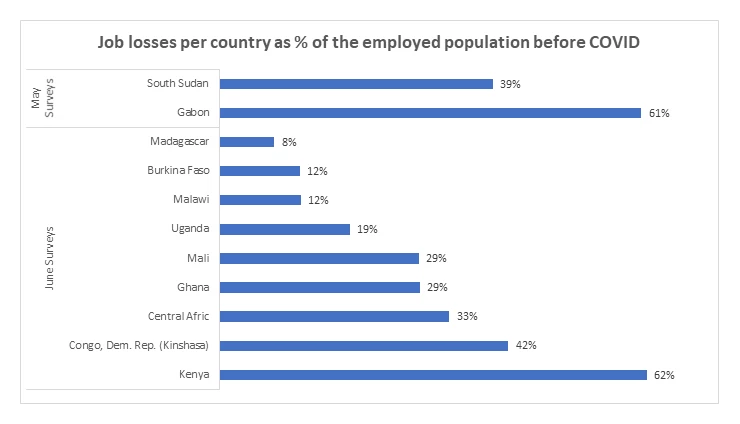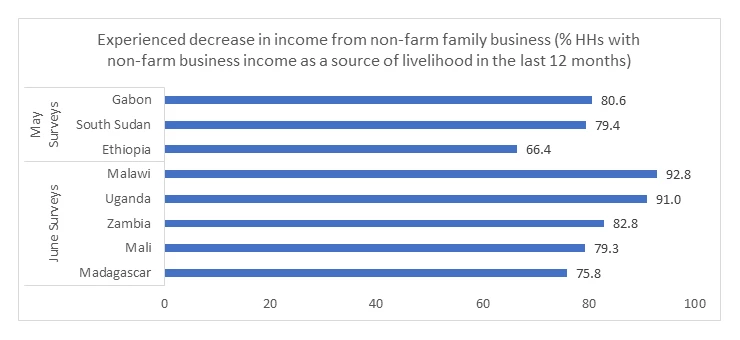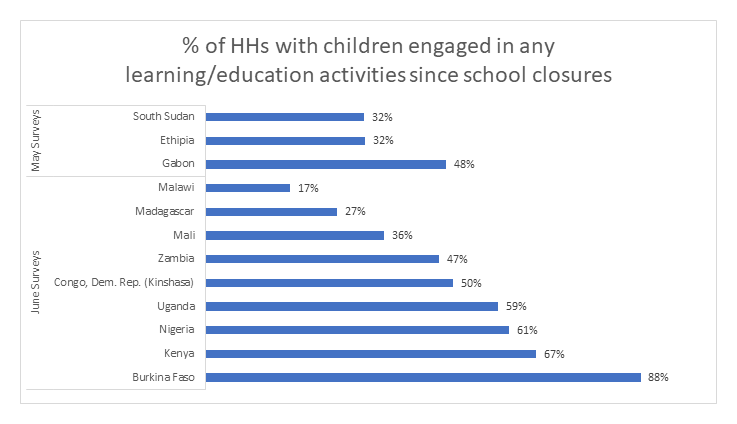Although rates of infection have not been as high as in other regions, the economic consequences of the COVID-19 (coronavirus) pandemic in Sub-Saharan Africa have been severe due to the combination of declining global demand and local efforts to contain the disease. In what is already a very vulnerable environment, Africans across the continent are facing serious challenges, requiring fast and effective intervention that must be carried out in an affordable way in the context of a rapidly shrinking fiscal space.
Accurate and timely data is key to the design and implementation of effective mitigation and recovery interventions. However, mobility restrictions and the ongoing threat of contagion have made it impossible to carry out large-scale face-to-face surveys. In response, the World Bank has launched a series of Rapid Response Phone Surveys of households and firms in more than 100 countries, including 41 in Sub-Saharan Africa. Early results have been published for Burkina Faso, Ethiopia, Kenya, Malawi, Mali, Nigeria, Uganda, and Zambia, and more results are constantly being made available. What emerges overall is a concerning tale of misinformation on prevention of the disease coupled with declining employment, livelihoods, food security, and human capital.
Knowledge of COVID-19 and reported engagement in preventive behavior is almost universal. Nearly all respondents have heard of the virus. Knowledge of the most common symptoms and possible mitigation measures is also widespread, with many engaging in practices such as washing hands frequently and social distancing. Misinformation is common, however. For example, 44 percent of respondents in Uganda believe that the coronavirus will not survive in warm weather, and 26 percent think that consumption of alcohol provides immunity.
On the positive side, the pandemic has not drastically affected access to health services. At least three-quarters of households are still able to obtain medical treatment in Nigeria, Malawi, Zambia, and Madagascar, and more than 90 percent in Kenya, Mali, and Ghana. On the other hand, in the Democratic Republic of Congo (Kinshasa) only 13 percent of households were able to access medical treatment when needed. The most common reason for limited access to medical services cited in Zambia was fear of contracting the virus, while in Uganda it was lack of money or transportation.
The data gathered so far indicate that across Sub-Saharan Africa, the COVID-19 pandemic has taken a major toll on livelihoods, food security, and human capital. Job losses are widespread, especially in urban areas and for female workers. The strict mobility restrictions imposed in most countries have severely disrupted economic activities and, despite some signs of recovery, employment remains below the pre-pandemic levels (Figure 1).
Figure 1: Job losses in COVID-19 times

Earnings from other sources fell dramatically as well. In Kenya, Nigeria, and Ethiopia almost 1 in 3 household enterprises closed at the outset of the pandemic. In Gabon, South Sudan, Malawi, Uganda, Mali, Madagascar, and Zambia, revenue declined for more than 70 percent of household businesses (Figure 2). Agricultural income also fell due to declines in farm prices, the closure of weekly markets, and restricted transportation. The global economic impact of the pandemic has meant that remittance flows have also fallen, with affected countries including Mali, Nigeria, Uganda, Burkina Faso, Malawi, Zambia, and Kenya.
Figure 2: Income losses in COVID-19 times

As would be expected, this drop in income has led to a reduction in consumption. However, the share of households forced to reduce their consumption of goods varies widely – from about 1 in 10 in Mali and Zambia, to 4 in 10 in Kenya and more than 8 in 10 in Kinshasa, Democratic Republic of Congo. Selling assets and relying on savings to pay for basic needs are common strategies among the relatively richer households that can have long-lasting negative impacts on income-generating opportunities.
Food insecurity also increased, often substantially. Compared to the previous year, food insecurity tripled in Nigeria, Ethiopia, Uganda, and Malawi. In Malawi, Nigeria, Kenya, South Africa, and Sierra Leone, more than half of households ran out of food in the 30 days prior to the survey, with urban households being disproportionally affected. School closures across all countries aggravated the problem by limiting children’s access to school feeding programs.
Access to education has been severely affected by the COVID-19 pandemic. In every country surveyed, schools were closed and replaced with remote learning activities, such as reading textbooks and listening to educational radio programs. However, the uptake of these solutions varied widely, with 9 in 10 children engaged in learning activities in Burkina Faso and 6 in 10 in Nigeria, but only 3 in 10 in Mali and less than 2 in 10 in Malawi (Figure 3). In most countries, children living in rural or poor households were more affected by school closures due to more limited access to internet, affecting the accumulation of human capital of the worst off and hindering their intergenerational economic mobility.
Figure 3: Children engaging in education activities in COVID-19 times

As the COVID-19 global pandemic evolves and as governments continue to adapt their policy responses, having ongoing access to accurate and timely data will be critical. The Rapid Response Phone Surveys will allow the World Bank and its partners to better understand the changing needs among beneficiary populations and the efficacy of programs already being implemented, as well as, for example, attitudes to a potential vaccination campaign. This innovative tool for data collection will also enable local governments and development partners to constantly improve targeting and ensure that assistance is reaching the households that need it most.
Although the crisis is far from over, with effective data collection and strong development programming, more households will be able to get the help they need in dealing with these emerging challenges.


Join the Conversation